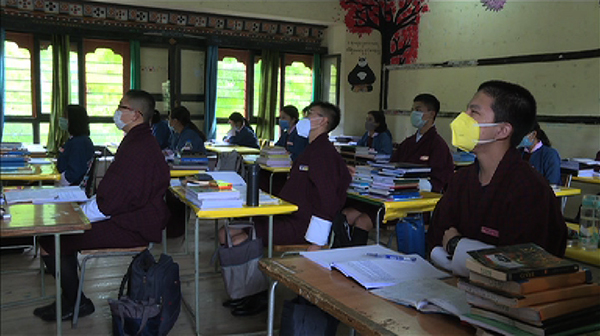 With on-campus learning interrupted for months due to the coronavirus pandemic along with a month-long nationwide lockdown, schools for classes IX to XII will re-open beginning this month. Classes X and XII will resume from Monday next week while classes IX and XI will begin from September 21.
With on-campus learning interrupted for months due to the coronavirus pandemic along with a month-long nationwide lockdown, schools for classes IX to XII will re-open beginning this month. Classes X and XII will resume from Monday next week while classes IX and XI will begin from September 21.
But those classes in high-risk areas will have to wait until the unlocking procedures are complete. The Education Ministry will relocate more than a thousand students and teachers of both public and private schools in Phuentshogling to schools in Wangdue Phodrang and Punakha. Education Minister Jai Bir Rai said students would be placed at Shengana Lower Secondary School, Thinleygang Primary School and Kuruthang Middle Secondary school in Punakha. And some of the students will be relocated to Tenchholing Primary School in Wangdue Phodrang. However, Chimithangka Middle Secondary School in Pasakha and Yonten Kuenjung Academy will not be relocated as these schools are outside Phuentshogling town. Education Minister shared henceforth, schools will be relocated if the area is declared as the red zone.
Meanwhile, Health Minister Dechen Wangmo at the press briefing today said, students studying in Phuentshogling who will be relocated to other schools will be tested.
“When the students go from Phuentshogling, they will be tested and quarantined for seven days and then will be tested again. Then normal classes will begin,” Lyonpo said.
As proposed by the Education Ministry, board exams for classes X and XII are postponed to March next year while exams for classes IX and XI would be conducted a month prior to the board exams.
Technical and Vocational Training Institutes, including private driving and tailoring courses, will also resume from today. And colleges will reopen as well.
Meanwhile, UNESCO-UNICEF-World Bank Survey on National Education Responses to COVID-19 school closure released last month found that globally more than 400 million students remain cut off from education, mainly due to lack of remote learning policies or lack of equipment needed for learning at home. UNICEF country representative Dr Will Parks in an interview last month said, school closures have an overwhelming amount of negative impacts on children such as interrupted learning, poor nutrition, parents unprepared for homeschooling, increased exposure to violence and exploitation and social isolation among others.
“A school is a social place where we enjoy being with our friends, we enjoy playing and we enjoy being with teachers and that sense of social isolation that is occurring when children are not going to school is something really important, it plays on their mental health particularly and for parents as well. We know it’s quite a struggle to balance work and looking after the children at the same time. So I think it’s important that we recognise that school closures while it’s precautionary also have a negative downturn for children and we need to balance the decisions,” said Dr Will Parks, the Representative of UNICEF Bhutan.
UNICEF calls for all schools, including ECCD centres, to be among the first services to re-open once appropriate safety measures are put into place.
Sonam Pem







